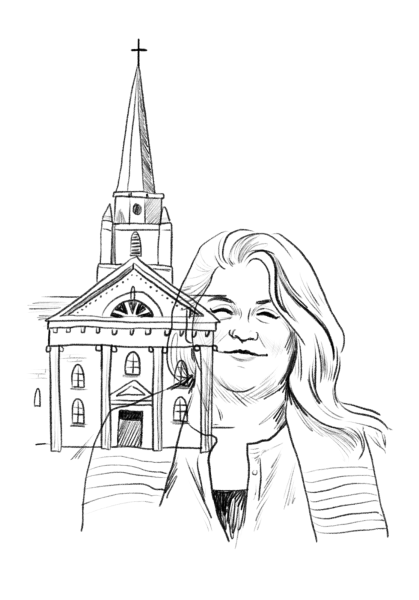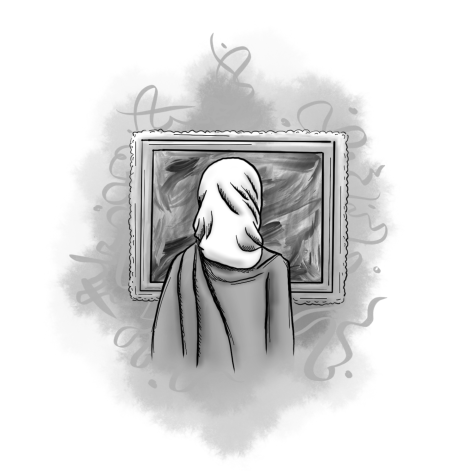Growing up, growing apart and growing together
April 20, 2023
Recently, I got into an argument with my brother. We both realized that our old tactics — fist fights and verbal banter that went too far — were not how we wanted to handle things anymore. It’s no longer who we are. Reforming my relationship with my brother has been an integral part of coming into adulthood. Differences in age, interests, gender and relationships with our parents all played a role in our dynamic. While these differences have led to ebbs and flows, my brother and I are closer than ever.
My brother is five years older than me, which in some ways has been a privilege: it allowed me to get a glimpse of what the next stage of life held and how to navigate its demands. On the other hand, being younger and female has always felt like an arbitrary ground for assuming my ability and capacity. Though my brother was positioned in a way that encouraged me to look to him for answers and direction, it pushed me to want to be much older and more masculine. Coming from a traditional Indian household warranted a lot less freedom for me in comparison to my older brother. While I was pressured to learn how to cook and was limited in my ability to go out and spend time with my friends, this was something my brother never had to think about.
I always wanted to figure out my own answers, or at the very least, not be told what to do — a common younger sibling occurrence. As I grew older, I began to realize how much the differences in our stages of life affected our dynamic. Once adulthood arrives, siblings are simply adults going through the same life stage in different ways.
Reflecting on my own ever-changing sibling relationship encouraged me to turn to others to hear about their sibling relationships and the differences in their perspectives.
Senior Bethany Hermann is the oldest of three: her younger brother is named Nathan, and the youngest is named Scott. She reflected on her parental role towards her younger brothers and how this was put into perspective as she got older. The intersections between gender and birth order placed her in a similar position as me. Hermann, however, acutely felt the gendered obligations of providing emotional support and setting a good example.
“Because I became sort of an authority figure, that caused a real rift between me and Nathan,” Hermann said. “In actuality, we were less than two years apart, but I was telling him to do things, and obviously, he didn’t want to do them. I didn’t know how to mitigate the fact that I used to be his friend but now I was weirdly a mother figure telling him to do dishes.”
The ages at which certain power dynamics show up among siblings are ages that also tend to create rebellion, confusion and identity formation. This time of conflict does not come to an end for everyone, but the intense nature of it often quiets with age. The space to grow and solidify our own relationships with ourselves and others holds the power to reorient what siblinghood looks like. The task to change a sibling relationship is no easy feat; it’s built on several years of constant exposure to one another. Hermann, like my brother and me, realized that it was a change that she needed to enact.
“[As the] oldest sibling, I just felt so much older than him for so much of my life. I think that when we were younger, two years and two grade levels felt like a lot,” Hermann said. “As we’ve grown up and as we’ve both become adults — we’re both in our 20s now — it stopped mattering that I feel older than him … The fact that it did matter so long ago plays a role [because] I still feel very worried about him and protective of him.”
Hermann’s experience getting older alongside her siblings made her realize that as the gap between experiences began to close, the importance of age became less important. The two year difference between twelve and fourteen may seem small in retrospect, but it’s characterized by enormous differences in school, relationships and puberty. This difference eventually becomes far less relevant: at some point, our lives become less about the discrete stages we go through.
Senior Nikhil Adarkar has had a similar experience with his younger sister, only two years below him. They both attended a small high school, so their academic lives were heavily informed and intertwined with their personal lives.
“Spending time apart, interacting with different people, seeing different things, experiencing different things, being away from home and all these little experiences being on your own for a little bit made us realize, ‘Alright, [my sibling isn’t] that bad,’” Adarkar said.
Distance from each other and shared experiences in working through adulthood have brought Adarkar and his sister closer together. While academic competition dominated their early relationship, moving away from one another allowed them to learn more about themselves and find value in learning more about each other.
Charlotte Elliot* is a senior that transgresses from the older/younger sibling dynamic, as she’s a triplet. Still, somehow, we all have sibling relationships that benefited from distance.
“We fought a lot when we were younger, but I don’t imagine it was any different to other siblings,” Elliot said. “It was just a bit more intense, as we shared a lot of the same friends and were rarely not in each other’s company. We’re a lot closer now that I’m 4,000 miles away and haven’t seen them in a year.”
For Elliot, this distance was especially jarring, as her relationship with her sisters had been a constant from the moment she was born. Separation from sisters to whom she had always been attached and compared to created a lot of space for the discovery of individuality and emotional growth.
“I’ve become a lot more open with my own emotions and can actually communicate that with my sisters now,” Elliot said. “I remember it was rare that we would have an actually deep conversation with each other, but they happen a lot more regularly now. I can say that I’m sad and not get a sarcastic comment in response.”
We’ve spent our whole lives building sibling relationships. They’ve weathered times when we couldn’t speak, let alone speak productively. While distance fosters better relationships among siblings, learning how to communicate boundaries, emotional needs and feelings has the potential to reorient our relationships entirely.
Hermann reflected on her relationship with religion in her family, and how her brother Nathan inspired her to rethink her identity.
“His rebellion against my parents used to really anger me when I was a lot less secure in my own identity,” Hermann said. “In recent years, as I’ve really examined my own identity, I’ve looked back and looked up to [Nathan] in his rebelliousness. [It] has really helped me as I’ve formed my identity.”
The difference in siblings’ relationships to their culture can be demonstrative of differences in sense of identity. As the youngest in my family to move to the United States, I was the most detached from Hinduism. This deeply impacted my relationship with the rest of my family, often making me feel like my brother’s connection to our culture afforded him more love from our parents. Today, neither of us practice nor have interest in Hinduism, which is something we’ve come to bond over.
Adarkar’s experience with mental health and emotional self-discovery heavily informs his reorientation with his sister. It also shed light on the general importance of vulnerability and building strong relationships.
“I ended up having to go back home to get some mental health treatment … for like four or five months last year. When I came out, part of my plan coming out was [that] I want to improve my relationship with my parents,” Adarkar said, describing how supportive his sister was during and after this time.
Relationships between siblings are some of the most unique and integral for those who get to experience them in some form or another. Figuring out how to transform a lifelong relationship to fit the person I have become and the person I want to be has been really challenging because, while distance has brought us closer, it also leaves so much we need to learn about each other. Most importantly, we need to learn that we can and have changed, and that how we treated each other as children was bound to change.
*Charlotte Elliot is a Campus Life Editor for The Wire.






